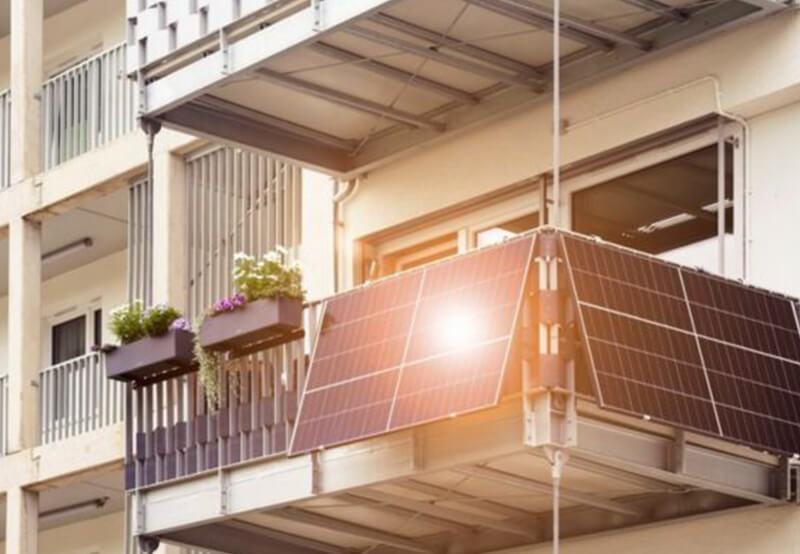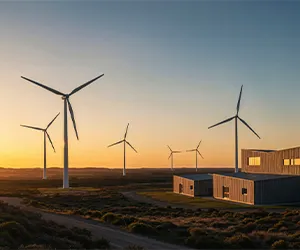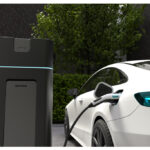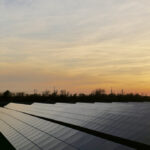Balcony Solar Panels: A Smart Choice for Apartment Residents
With the world transitioning to more renewable and clean energy production, balcony solar panels are becoming a viable and affordable option that apartment residents can use to enjoy clean energy. With rapid urbanization, high-rise buildings, and limited access to traditional rooftop solar installations, portable solar panels are transforming the way city residents harness solar energy for apartments. These easy-to-install solar panels provide a viable alternative for those seeking solar solutions for apartments, offering energy savings, environmental benefits, and reduced dependence on conventional electricity grids.

The Growing Popularity of Balcony Solar Panels
In recent years, balcony solar panels have gained immense popularity, especially in densely populated cities where access to rooftop space is a challenge. Germany, for instance, has seen a massive surge in plug-in solar system installations, with over 550,000 installed units—mostly balcony solar panels. In the first half of 2024 alone, approximately 220,000 new solar balconies were added, showcasing the increasing adoption of this technology.
This trend highlights the growing awareness of sustainable energy solutions and the willingness of individuals to contribute to the global shift toward renewable energy. Balcony solar panels allow tenants and homeowners in apartments to actively participate in the green energy movement without requiring extensive modifications to their living spaces.
Government Initiatives Supporting Balcony Solar Panels
Recognizing the potential of balcony solar panels, governments around the world are rolling out policies to popularize them. In India, the Ministry of New and Renewable Energy (MNRE) updated its guidelines for PM Surya Ghar Scheme to cover balcony solar panels under it. This action allows more residents in apartments as well as homeowners to benefit from subsidies and fiscal incentives for having simple-to-install solar panels, making solar solutions for apartments cost-effective and accessible.
Government incentives and streamlined installation procedures are making it simpler than ever for urban dwellers to bring solar energy into their homes. From plug-in solar panels to small photovoltaic (PV) systems, the trend toward decentralized solar energy production is on the verge of becoming reality in urban households.
Why Balcony Solar Panels Are the Future of Urban Energy
- Affordability and Cost Savings: An affordable method of producing electricity for everyday use is with balcony solar panels. By reducing reliance on grid electricity, they provide a return on investment and help lower energy bills. Flat dwellers can save money over time and recover installation costs more quickly with financial incentives like Germany’s renewable energy subsidies and the PM Surya Ghar Scheme.
- Sustainability and Environmental Impact: Harnessing solar energy for apartments reduces carbon footprints and minimizes reliance on fossil fuels. Installation of solar panels in balconies by city residents lead to a greener environment, reduced green house emissions and improvements in energy stability.
- Ease of Installation and Portability: Unlike traditional rooftop solar systems, balcony solar panels are designed to be plug-and-play, requiring minimal setup. These portable solar panels can be easily mounted on railings, walls, or even placed on the floor of a balcony. Their lightweight nature allows renters and homeowners to install them without professional help, making solar solutions for apartments more convenient than ever.
- Energy Independence and Grid Resilience: Balcony solar panels that are placed in the balconies allow the urban residents to produce their own supplies decreasing their reliance on the unstable grids of electric power. This especially helps in areas where there has a likelihood of power failure or an increase in power charges. With portable solar panels, households can store excess energy and use it during peak hours, further optimizing energy consumption.
- Scalability and Flexibility: Due to the modular nature of balcony solar panels, users can begin with a single unit and progressively increase their setup in accordance with their energy requirements. They are the perfect option for renters who might want to move and take their solar panels with them because of their versatility.
Overcoming Challenges in Balcony Solar Adoption
Although balcony solar panels have many advantages, some challenges must be overcome to reach their full potential:
- Regulatory Approvals: Certain housing societies and landlords might have limitations on balcony alterations. There needs to be advocacy for clearer policies regarding balcony solar panels to make adoption easier.
- Shading Problems: Apartments in urban areas tend to suffer from shading by neighboring buildings, lowering the efficiency of solar panels. Strategic placement and creative mounting schemes can assist in counteracting this problem.
- Battery Limitations: While balcony solar panels can power small appliances and lighting, storage solutions need further improvement for round-the-clock energy use.
The Future of Balcony Solar Panels
As technological advancements continue, balcony solar panels are becoming more efficient and accessible. Countries worldwide are recognizing their role in decentralized solar energy generation, leading to more favorable policies and incentives. With increased adoption, solar energy for apartments is set to become a mainstream solution for urban energy needs.
In conclusion, balcony solar panels offer an affordable, sustainable, and efficient way for apartment residents to harness solar power. With government support, improved technology, and growing consumer awareness, these easy-to-install solar panels are paving the way for a cleaner and greener future. Whether you’re a homeowner, tenant, or investor, now is the perfect time to explore the potential of balcony solar solutions for apartments.
Frequently Asked Questions (FAQs)
Balcony solar panels typically generate between 300W to 800W, depending on the panel size, efficiency, and sunlight exposure.
Yes, balcony solar panels are designed with safety in mind. They come with plug-and-play connections and built-in protection features to prevent overloading or overheating.
Regulations vary by location. In some cities, homeowners may need approval from housing associations or local authorities. It’s best to check local guidelines before installation.
Yes, balcony solar panels can still generate power on cloudy days, though at a reduced efficiency compared to sunny conditions.
Yes, you can connect your balcony solar panels to a battery storage system to save excess energy for later use.











